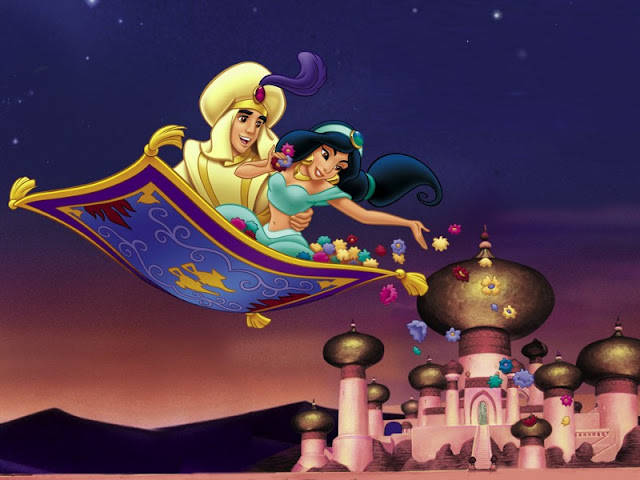The 1001 Nights
Whoever
Whenever
An
Alexandrine Couplet About The 1001 Nights
A king wanted to shag and kill lots of
women;
One knew his kryptonite—half finished
short stories.
The original 1001 Nights go back much further than any book version. Like most
collections of cultural stories, there never was an original, definitive set,
just an amalgamation of many different texts and disparate oral traditions.
With that being said, I certainly don’t know a great deal about the origins.
I know the 1001 Nights came to the West in the early 1800s and have been translated
to English many times by many people. The version I read and that most of this
blog is based on – the Harvard Classics – is probably not the best collection
or translation, so take it with a grain of salt.
 |
| Check. |
Basic Premise: A king falls in love and
gets married. Everything’s great until he catches his wife having orgies with
women of the court and slaves in the palace garden (they left that part out
when I was in kindergarten). He has her killed, then marries a different chick
every day, has his wedding night, and murders them in the morning so that they
won’t be able to betray him. A clever and daring lass bets if she can start
telling him a story on their wedding night, get him really interested, and
claim a headache, he’ll give her till the next night to finish it. If she does
this every night for a long time, she’ll survive until he actually loves her
and then he’ll just let her live, and as far as I can tell this isn’t an
extended metaphor for sex – it’s actually story telling. The 1001 Nights are the stories the bride
tells.
Man, she must have had some great
stories.
 |
|
Thank Jack Daniels, but
that’s not exactly what I was trying to get across.
|
The most famous of these stories, at
least if you grew up in an American school, are Ali Baba And The 40 Thieves and Aladdin
which, arguably, are some of the least original, but that’s neither here nor
there.
The stories we kids in California were
told had some differences from the ones The Harvard Classics told me. For
example, Ali Baba didn’t do too much, really. His slave girl (who was loyal and
just thrilled to be his slave!) discovered and killed most of the thieves
herself while Ali Baba wasn’t paying attention. He was so happy he set her
free. When she later killed the leader of the thieves, Ali Baba was so happy he
married her to his son. Since he didn’t ask either of them first I’m not sure
what her freedom was actually worth. You can see how there are some problematic
ideas for a modern audience. Oh, and how Ali Baba is kinda a dick.
 |
|
He’s no Draco Malfoy, but who is?
|
And then there’s Aladdin.
 |
|
The story has neither a
monkey nor a magic carpet,
but thanks for trying, Disney. |
Aladdin, as it turns out, should be
spelled ‘Ala-ed-Din, but apparently that’s way too complicated for white folks
so we just changed it, which is pretty messed up.
The kid was a lazy bum, not the street-smart
orphan thief Disney would have you believe in. He basically did nothing all day
while his sad Mom worked her fingers to the bone. Jafar was an evil sorcerer,
but he was evil mostly because he was a Moor (read: black), and because the 1001 Nights are racist.
‘Ala-ed-Din gets the lamp, uses it to
break up the Sultan’s daughter’s marriage before she losses her virginity
(because otherwise, what’s she good for? – Seriously, there are some messed up
details in these stories), marries her, kills Jafar and his equally evil (and
equally black) brother, and literally has all the power and magic in the world
and can accomplish anything, but instead of doing away with war or hunger he
mostly just creates extra slaves out of thin air and throws money at people so
they’ll love him.
And again, no Magic Carpet. Totally sad.
Sure, these stories have lots of racism
and sexism, but virtually all old stories have those and you have to see it as
history, not progressive fiction. Overall, I liked it more than I expected and
it’s worth picking up. Especially because of the short story format, if you
don’t like a part, you can just skip it and move on to the next one.
Or just read the ones with Jinn running
around doing things. The jinn are pretty spectacular, apparently!
 |
|
I’m spectacular. Snarl.
|


No comments:
Post a Comment